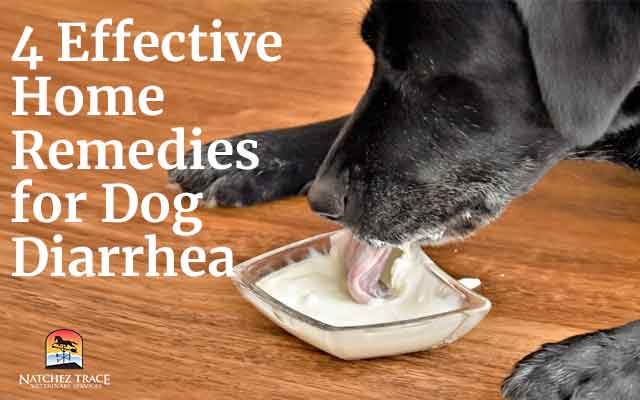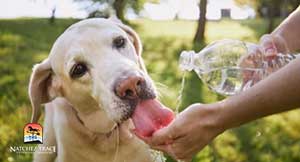 When your canine companion experiences diarrhea, it’s natural to seek gentle yet effective remedies to alleviate their discomfort. Understanding the signs of the ailment and knowing when to apply home remedies for dog diarrhea are crucial parts of caring for your pet.
When your canine companion experiences diarrhea, it’s natural to seek gentle yet effective remedies to alleviate their discomfort. Understanding the signs of the ailment and knowing when to apply home remedies for dog diarrhea are crucial parts of caring for your pet.
In this guide, we’ll explore practical and natural approaches for managing mild cases of dog diarrhea right at home. Furthermore, we’ll unravel the puzzling scenario where your dog might have diarrhea but continues to behave normally, providing insights into canine health and offering supportive measures for their well-being. Check out Dr. Smith’s Youtube video about home remedies for dog diarrhea to learn more.
Identifying Dog Diarrhea
Identifying diarrhea in your dog involves recognizing key signs and understanding the variations in severity:
- Frequency and Consistency: Increased frequency of bowel movements, often loose or watery in consistency, indicates diarrhea. Observing the stool’s texture and color helps differentiate normal bowel movements from diarrhea.
 Accompanying Symptoms: Additional signs may include straining during defecation, urgency to relieve themselves, or visible mucus or blood in the stool. Such indicators often point to gastrointestinal distress.
Accompanying Symptoms: Additional signs may include straining during defecation, urgency to relieve themselves, or visible mucus or blood in the stool. Such indicators often point to gastrointestinal distress.- Behavioral Clues: Watch for changes in your dog’s behavior; they might exhibit lethargy, decreased appetite, or signs of discomfort such as abdominal pain or bloating.
- Duration and Severity: Mild cases might resolve within a day or two, while persistent or severe diarrhea lasting more than 48 hours warrants prompt attention from a veterinarian.
- Differentiating Mild from Severe Cases: Mild cases might show occasional loose stools but maintain overall good energy and appetite. Severe cases involve frequent, watery stools, potential vomiting, dehydration, and lethargy.
Understanding these signs helps distinguish between mild, moderate, and severe cases of diarrhea in dogs, enabling timely and appropriate action to address their discomfort.
Causes of Dog Diarrhea
Dog diarrhea can stem from various factors, ranging from dietary changes to underlying health issues:
- Dietary Changes: Abrupt alterations in your dog’s diet such as new foods, spoiled foods, or inappropriate foods can trigger gastrointestinal upset and diarrhea.
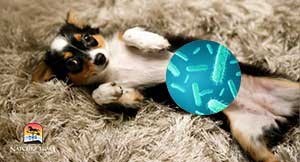 Infections and Parasites: Bacterial infections (e.g., Salmonella, E. coli), viral infections (e.g., Parvovirus), or parasites (such as Giardia or worms) can lead to diarrhea.
Infections and Parasites: Bacterial infections (e.g., Salmonella, E. coli), viral infections (e.g., Parvovirus), or parasites (such as Giardia or worms) can lead to diarrhea.- Food Intolerances or Allergies: Dogs might exhibit diarrhea due to sensitivity or allergic reactions to specific food ingredients, including grains, certain proteins, or additives.
- Stress or Anxiety: Emotional stress or anxiety, changes in routine, or new environments can impact a dog’s digestive system, causing diarrhea.
- Underlying Health Conditions: Conditions like inflammatory bowel disease (IBD), pancreatitis, liver or kidney disease, or hormonal imbalances can manifest as chronic diarrhea in dogs.
- Ingestion of Foreign Objects: Swallowing foreign objects or toxic substances can irritate the digestive tract, leading to diarrhea as the body attempts to expel these irritants.
Identifying the root cause of your dog’s diarrhea involves considering recent changes in their environment, diet, or exposure to potential pathogens. Consulting with Dr. Smith helps pinpoint the specific cause and guides appropriate treatment for your pet’s condition.
Effective Home Remedies for Dog Diarrhea
Several safe and practical home remedies can help manage mild cases of dog diarrhea:
- Fasting for 24 Hours: Temporarily withholding food for 24 hours allows the digestive system to rest and recover. Ensure access to water during this period to prevent dehydration.
- Probiotics and Fermented Snacks: Introducing probiotics Dr. Smith’s Harmonize GI Supplement or yogurt with active cultures helps r
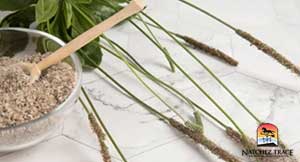 eplenish beneficial gut bacteria and restores digestive balance.
eplenish beneficial gut bacteria and restores digestive balance. - Psyllium Husk (like Metamucil): Administering Psyllium Husk based on weight (¼ teaspoon for dogs under 25 pounds, ½ teaspoon for 25-50 pounds, 1 teaspoon for over 50 pounds) can aid in firming stool consistency. Administer twice a day.
- Hydration: Encourage your dog to drink water frequently to prevent dehydration. Adding a bit of low-sodium chicken or beef broth to the water can entice them to drink more.
These home remedies can often help alleviate mild diarrhea in dogs. However, if symptoms persist, worsen, or your dog shows signs of dehydration or discomfort, it’s essential to seek veterinary guidance promptly.
Cautions and Consideration
While home remedies can be effective for mild cases of dog diarrhea, it’s crucial to proceed with caution and be mindful of certain considerations:
- Consult a Veterinarian: Always consult us before administering home remedies, especially if your dog is young,
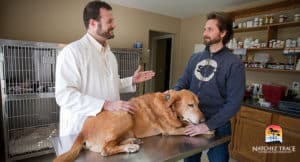 elderly, or has underlying health issues.
elderly, or has underlying health issues. - Avoid Overuse of Medications: Refrain from administering over-the-counter medications without veterinary approval, as some medications can worsen symptoms or be toxic to dogs.
- Watch for Dehydration: Monitor your dog for signs of dehydration such as excessive lethargy, sunken eyes, dry gums, or reduced skin elasticity. Seek immediate veterinary care if dehydration is suspected.
- Be Mindful of Dosages: Adhere strictly to recommended dosages and guidelines for home remedies, especially Psyllium Husk, to prevent potential adverse effects.
- Observe Behavioral Changes: Keep an eye on your dog’s behavior and appetite. If they exhibit extreme lethargy, severe abdominal pain, or persistent vomiting, seek immediate veterinary attention.
- Discontinue Home Remedies if Symptoms Worsen: If diarrhea persists or worsens after a day or two of home treatment, discontinue remedies and seek professional veterinary advice from Dr. Smith.
- Monitor Stool Consistency: Regularly observe your dog’s stool consistency and color. Notify your vet if diarrhea continues for an extended period or if you notice blood or mucus in the stool.
Prioritizing your dog’s well-being involves cautious and attentive care. While home remedies can often aid in managing mild diarrhea, vigilance and prompt veterinary attention are essential when symptoms persist, worsen, or if your dog’s condition deteriorates.
Conclusion
 Managing dog diarrhea at home requires a delicate balance of care and caution. Home remedies offer practical and safe approaches for easing mild cases, but a watchful eye and timely veterinary guidance remain paramount.
Managing dog diarrhea at home requires a delicate balance of care and caution. Home remedies offer practical and safe approaches for easing mild cases, but a watchful eye and timely veterinary guidance remain paramount.
Understanding the signs of diarrhea, identifying potential causes, and implementing effective home remedies such as fasting, probiotics, Psyllium Husk, and hydration aids in restoring digestive balance. However, it’s crucial to exercise prudence. You can contact us via Live Chat before administering any treatments, especially if your dog shows signs of dehydration, discomfort, or if symptoms persist beyond a day or two.
 While home remedies can often alleviate mild diarrhea, persisting or severe symptoms warrant professional veterinary evaluation. Prioritizing your dog’s health involves proactive monitoring, cautious intervention, and seeking expert guidance when necessary, ensuring your furry companion receives the best care for their well-being.
While home remedies can often alleviate mild diarrhea, persisting or severe symptoms warrant professional veterinary evaluation. Prioritizing your dog’s health involves proactive monitoring, cautious intervention, and seeking expert guidance when necessary, ensuring your furry companion receives the best care for their well-being.
To more about home remedies for dog diarrhea, watch Dr. Smith explain this in detail in this video.
People Also Ask:
- Can fiber stop diarrhea in dogs? Yes. It may sound strange that fiber can both speed up bowel movements and at the same time, stop diarrhea in dogs.
- How long can a dog have diarrhea without going to the vet? If you have determined that it will likely be okay to try and “ride out” your dog’s diarrhea for 24 to 36 hours, try the home remedies mentioned above. If the diarrhea persists, make an appointment to see Dr. Smith.
- What are the different types of dog diarrhea? Bloody diarrhea, dog diarrhea with mucus, dog diarrhea with worms, water diarrhea in dogs, dark diarrhea in dogs.

